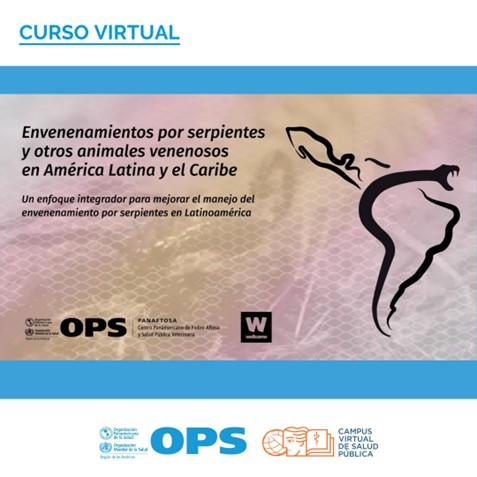Curso Virtual: Envenenamientos por serpientes y otros animales venenosos en América Latina y el Caribe
En el Campus Virtual de Salud Pública de la Organización Panamericana de la Salud (OPS) / Organización Mundial de la Salud (OMS) está disponible el Curso Virtual Envenenamientos por serpientes y otros animales venenosos en América Latina y el Caribe. El curso cubre temáticas relacionadas con las especies ponzoñosas/venenosas de mayor importancia médica en la región, aspectos ecoepidemiológicos y clínicos de forma integral, definiendo acciones terapéuticas y de prevención que permitan disminuir la morbimortalidad de los envenenamientos, incluyendo también la vigilancia sanitaria como un pilar clave en esta tarea y para conocer la real dimensión de esta problemática de salud que aún permanece subnotificada.
Los accidentes causados por animales ponzoñosos/venenosos constituyen un grave problema de salud pública a nivel global, siendo el accidente ofídico el de mayor impacto, tanto por su frecuencia como por la gravedad de sus manifestaciones clínicas. En 2017, OMS incorporó este evento de salud a su lista oficial de Enfermedades Tropicales Desatendidas y desarrolló una estrategia global que tiene como meta para 2030 la reducción en un 50% de la mortalidad y las secuelas causadas por envenenamientos. Además, en la región son importantes también los envenenamientos por picaduras de escorpiones y mordeduras de arañas, así como los envenenamientos por contacto con orugas de Lonomia.
OPS a través del Centro Panamericano de Fiebre Aftosa y Salud Pública Veterinaria (PANAFTOSA/SPV), y con la colaboración de expertos regionales, diseñó este curso con el propósito de contribuir a la disminución de la morbimortalidad de personas que sufren accidentes con animales ponzoñosos/venenosos en América Latina y el Caribe (ALC), mediante el fortalecimiento y mejora de las capacidades del profesional sanitario sobre la prevención, el abordaje clínico y las estrategias posibles para el tratamiento y la recuperación de los pacientes, haciendo un uso racional y adecuado de los antivenenos disponibles en la región, entre otras.
Finalidad
Proporcionar un marco de conocimiento de base científica para que las personas trabajadoras de salud puedan fortalecer y mejorar sus capacidades para la atención médica, la vigilancia, prevención y control de los accidentes con animales ponzoñosos/venenosos, con un especial énfasis en el ofidismo.
Ver detalles y registrarse en el siguiente enlace
https://campus.paho.org/es/curso/envenenamientos-serpientes-animales

Curso Virtual Envenenamientos por serpientes y otros animales venenosos en América Latina y el Caribe, 2025 / Virtual Course Envenenamientos por serpientes y otros animales venenosos en América Latina y el Caribe, 2025.
Support the community
Thank you for visiting The Global Health Network, please take a moment to read this important message. As you know, our aim is to enable equity in access to research knowledge and this is successfully delivering support and training to 1000’s of research teams all over the world. But we need your support!. If you have benefited from this research skills and knowledge sharing facility, please help us sustain this remarkable and unique provision of information for those who could otherwise not access such support and training. We would be really grateful if you could make a donation or ask your employer or organisation to contribute to the costs of maintaining this platform and the generation of new contents for all users. Just a small contribution from everyone who can afford to pay would keep this available for those who cannot. Thank you, we really appreciate your part in this community effort to better equity in global health research.
